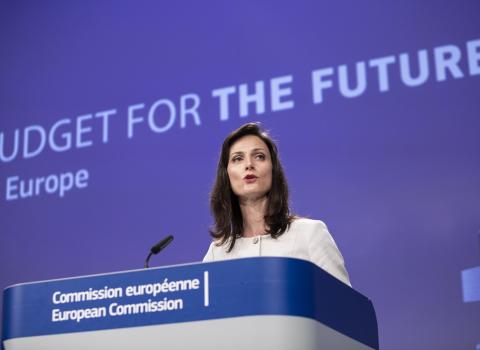EU will put in a guaranteed €38 billion in a bid to catalyse €650B of private investment, of which research, innovation and digital projects will get €200B

Commission vice president Jyrki Katainen. (Photo: European Commission)
The European Commission’s new mega-investment fund, InvestEU, wants to raise €200 billion for research, innovation and digital projects between 2021 and 2037, officials said on Wednesday.
In addition to research, the programme, which brings a multitude of financial instruments under one umbrella, will steer investment in sustainable infrastructure; small and medium-sized businesses; and social investment and skills.
“It’s not a magic wand, but it’s a way of catalysing investment that otherwise would not have happened. The ambition is very high and we’re going to take risks,” said a senior commission official.
The overall target is to generate investment of €650 billion, through an EU budget guarantee of €38 billion.
According to detailed plans published by the Commission, InvestEU can, “Help increase the impact of public funds. In this way we can do more with less.”
Pulling a number of schemes into the InvestEU fold means companies will no longer have to deal with different eligibility, monitoring and reporting requirements when they are looking for financial backing.
The template is the giant European Fund for Strategic Investments (EFSI), or Juncker Plan, which the Commission says has triggered €290 billion in investment, benefiting 635,000 small businesses. The fund will make its final investments in 2020.
The leverage effect for EFSI is 15, meaning every €1 put in is expected to generate €15 of investment. For InvestEU, this effect will be slightly smaller at 13.7, because officials think there is a limit to the money that can be raised for social housing projects, a part of the economy without a huge market.
The European Investment Bank will be the main manager of the fund, and is expected to put up three-quarters of the guarantee.
Other financial institutions, including the European Bank for Reconstruction and Developments, the World Bank, the Council of Europe Bank, and national promotional banks, will also have direct access to the EU guarantee.
Projects with very different risk profiles will be considered. If it is finance for life sciences projects, the risk will be assumed high, said a Commission official. The new fund may also blend loans with grants provided by the new research programme, Horizon Europe.
The scheme has attracted criticism, with Commission vice president Jyrki Katainen having to deny to MEPs that it constituted a “power-grab”.
To be eligible for investment, project promoters will have to pass a due diligence test and an “EU policy-fit test”, before coming before an investment committee for a final decision. Banks “will be requested to second a number of banking and risk management experts to the Commission for this purpose.”
The evaluation process should last six months to a year. Committee members will be finance experts paid out of the EU budget and recruited through an open process.
Member states may add to the guarantee by putting up to 5 per cent of their cohesion fund allocation to the pot. Given the high credit rating of the EIB, this would give regional investments more firepower, the Commission said.
EU investment schemes have mushroomed in the last seven years, creating complexity. There are almost 40 financial instruments, including EFSI, InnovFin and three budgetary guarantees and guarantee funds that together amount to a share of around 4 per cent of the current EU budget.
The large number of instruments and the divergent rules applying to them, has become “an obstacle to their efficient use,” the EU concluded last year.
The European Council and Parliament will debate the InvestEU plan before it takes effect in 2021.







 A unique international forum for public research organisations and companies to connect their external engagement with strategic interests around their R&D system.
A unique international forum for public research organisations and companies to connect their external engagement with strategic interests around their R&D system.